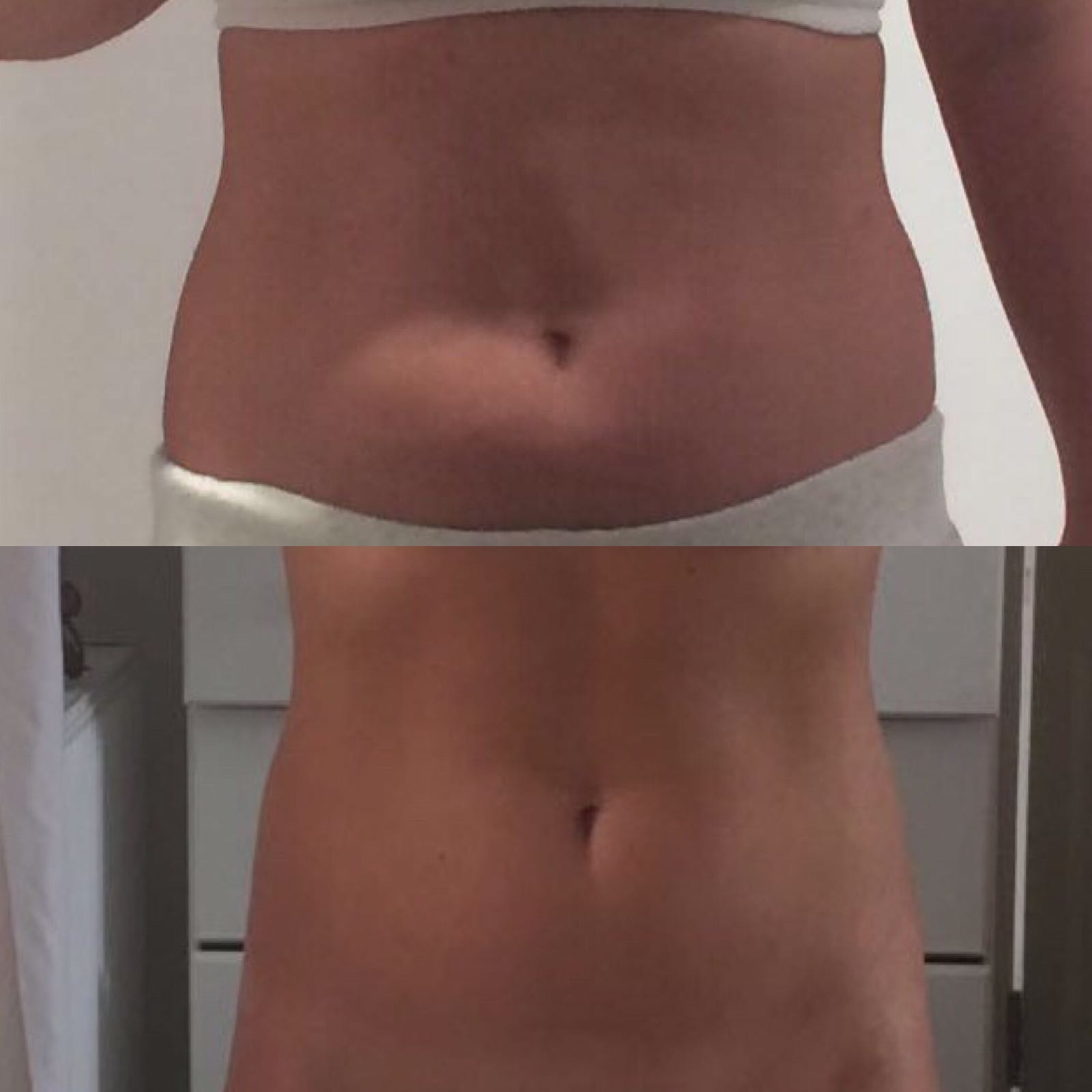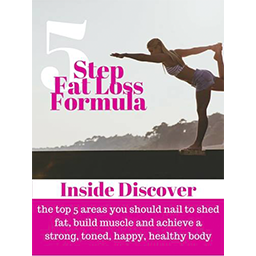When I first met Ali she had entered and completed an Iron Man Triathlon (2.4 mile swim, 112 mile bike and 26 mile run) in an attempt to control her weight.
Surely someone training and doing this amount of exercise would be able to drop a few pounds? She had even paid a nutritionist to write her a “personalised” nutrition plan to accommodate her training and her weight loss goals.
But nothing had happened.
But her weight wasn’t her only challenge.
She suffered from anxiety, had difficulty managing her high stress working environment and she was also affected by PCOS and endometriosis. Not to mention non-specific symptoms such as foggy brain, bloating after eating, constipation, lethargy and low mood.
Shortly after we began working together she got engaged. This obviously shifted her focus to weight loss even more as she prepared for the big day and looking amazing in her wedding dress.
We worked together over the course of 7 months in preparation for her wedding. It was not an easy journey, but in that time she lost a stone in weight and achieved her lowest weight for her wedding day.
There were a few important things that we did, and if I am honest, these are not “special” things that we only do for women with PCOS, these are things that I do with all my clients which make a difference.
1) Calorie and Macro Controlled Diet
This is my preferred method of client monitoring. Studies have shown that most people underestimate how much they eat by up to 50%. I use My Fitness Pal, but even keeping a written food log can raise awareness and improve portion control.
Using My Fitness Pal enables me to work a few layers deeper with my clients because we not only look at calories, but we can look at protein, carbohydrates and fats and make sure that this balance is right.
Women with PCOS tend towards insulin resistance which means that they don’t do so well on a diet high in carbohydrate and probably need to be more vigilant with their intake of carbohydrate foods.
Counting carbs and watching for the amount of sugar and fibre in the diet can be particularly successful. When I work with clients I individually prescribe what targets they need to hit based on their body type, health status, stress and daily activity levels.
2) Food Quality
Calorie and macro management is a really good first step for anyone trying to shed a few extra pounds. Ensuring that calories comes from good quality foods is also important.
Every food that we eat interacts with our digestive system, and more importantly the organisms that take up residence inside of it. Feed your body good food and you cultivate good levels of beneficial bacteria. Eat sugar, refined carbohydrates and few fresh vegetables and you potentially do the opposite.
It got to a point with Ali where she was hitting a plateau. Although she was technically managing her calories and macros, I thought her food quality good be better. Being affected by PCOS and Endometriosis I felt that she had less flexibility than someone without.
She was incredibly self motivated and really tightened things up by eating plenty of fish, prawns and lean poultry, beneficial fats such as avocado and olive oil, colourful vegetables, she gave up gluten and dairy and focussed on carbohydrates from sweet potato and brown rice. Eating in this simple, wholefood way, really helped her to fully understand what was going in to her body and ensured she could manage it.
3) Manage stress.
Ali was working in corporate central London. There were huge demands on her time and energy, not to mention massive personal stressors going on at home. She really took on board the mindset elements of my coaching program and took it upon herself to do daily meditation, listen to the recommended audiobooks as well as integrate yoga into her weekly routine. Her ability to manage personal situations and cope with daily work stressors greatly improved, as did her anxiety and mood.
4) We reduced her exercise.
Having done an Iron Man, Ali was an A-type personality. Nothing was done by halves. She was exercising intensely lifting weights in the gym almost every day.
After a period of progress Ali hit a plateau. We adjusted her food intake, yet I couldn’t help but feel she was just putting her body under too much pressure with her training.
She was experiencing some niggling injuries and lower back pain. When a client gets injured this always sets off little alarm bells in my mind. If someone is exercising safely and appropriately, the body should be able to recover, adapt and heal. Injury is usually a sign that something is out of balance and it is often (apart from biomechanical imbalances) when exercise is too much and fuelling too little.
We were closely monitoring Ali’s diet, so it had to be the exercise that was causing her to over-reach. After a little resistance, I got her to drop her gym sessions to 2 per week, 1 yoga session a week and plenty of walking during her day.
5) Supplements
I personalise supplements for all my clients so please understand that this reflects what we did for her. It is not a prescription for just anyone. There are several supplements that work well for women with hormonal complaints. We used the following:
• Vitex Agnus Castus to raise progesterone
• Curcumin to manage inflammation
• Magnesium for stress, anxiety and insulin sensitivity (in a nutshell, magnesium works across 300 different enzyme pathways in the body)
• DIM to support oestrogen metabolism
• Zinc for hormonal balance and insulin sensitivity
• B-complex for hormonal balance, methylation and energy pathways
• Digestive enzymes to support digestion and bloating
• Probiotic to support digestion and modulate inflammation
All of the above worked a treat and she was the most beautiful bride on her wedding day both outside and in. The work together not only gave her the body confidence, but the reduced internal stress and increased happiness, were invaluable. She was able to enjoy her wedding and honeymoon with only a small increase in weight.
And then…
Things took a turn for the worst…
Once Ali returned from honeymoon she did her best to get back into a normal routine and pick up where she left off.
We had stopped working together at that time and she was working under her own steam.
One day I got a message…
I am doing everything you taught me and nothing is working!
After asking a few questions it was clear that she had fallen into some old bad habits. Under-eating, lacking consistency with her food intake, alcohol had creeped back in quite a bit and there was too much training and stress.
I gave her some tough love and pointed this out and she took my advice onboard, yet things were just not shifting.
After some discussion we decided she should do a stool test.
I think this is something that a lot of people are reluctant to do. Despite the fact it costs £300 (a significant financial investment), the idea of collecting your own poop and then sending it off in the post is not the most appealing offer.
But she did it.
And I think the only regret was that she hadn’t done it a year ago when we first started working together.
She had been supplementing with a probiotic for ages and her levels of beneficial bacteria were good.
Her bloating, constipation and foggy brain weren’t being created by low levels of beneficial bacteria.
What we did find was 2 parasites, a small amount of yeast and overgrowth of additional bacteria potentially indicating small intestinal bacterial overgrowth (SIBO) and low levels of the gut immunoglobulin secretory IgA.
What does this mean?
SIBO is what the name says, an overgrowth of bacteria in the small intestine. We have trillions of bacteria in the large intestine, the colon, and less bacteria in the small intestine. Due to modern diets, alcohol, use of medications & stress, we can sometimes cultivate higher levels of bacteria in the small intestine than normal.
This can lead to symptoms commonly associated with IBS such as constipation, bloating, diarrhoea, foggy brain, abdominal cramps, flatulence, belching and acid reflux.
One of the roles of the gut bacteria is to break down carbohydrate.
We live in a world we very often eat on the go. We eat in a stressed state and we don’t chew. Digestion is a “parasympathetic process” which means that to happen appropriately, we must be relaxed.
When we eat in a relaxed state and chew properly we able to release digestive enzymes which break down our food and enable us to absorb nutrients appropriately.
If this doesn’t happen, we can have undigested food particles sitting in our gut which are then left at the mercy of the bacteria that reside there. These bacteria ferment food particles and then create gas associated with wind, belching and bloating.
The gut is often referred to as the second brain. There is a bidirectional neuronal connection between our digestive system and our brain. Many of our neurotransmitters are made in the gut.
Often, SIBO can be linked with stress, brain fog, poor memory, anxiety and low mood or depression. Many of the symptoms Ali was experiencing.
SIBO is a complex issue and it goes above and beyond the scope of this case to talk about it in detail. But the final piece of the puzzle is that, because of the link between the gut and the immune system, it can also be associated with insulin resistance, something which is so closely knitted with PCOS.
So what did we do?
Our strategy was obviously all about balancing the gut and we used the 5R Protocol to do this:

The outcome?

- Weight loss (back down to wedding weight and beyond!) – comment from her husband “I can see your abs coming through!”
- More regular bowel movements
- No more bloating and foggy brain
- Better energy
- More empowered to take ownership and control of her health
- Balanced body and balanced mind
After the gut protocol we added in some supplements that I use based on my Psychoneuroimmunology Training, these supplements are for PNI practitioners only, however Ali found that they made a massive difference in her mood & stress levels in combination with her diet, exercise and lifestyle practises.
I sent her all of the above after it was written to check for accuracy and these were her final comments…
The only thing I would suggest is a good old happy ending. The weight came off and settled out by itself without much work or tracking.
It was just the small tweaks that made all the difference and most importantly it is the realisation that this is something I’ll need to manage life long but with the right tools/starting point, it can be done easily and without much fuss.
[her words, not mine]

I run a small Online Women’s Weight Loss Program that offer a personalised nutrition and exercise support to produce life changing and life-lasting results.
If you want to give up the guessing game and have someone just tell you what to do and hold you accountable to actually doing it then this is probably exactly what you have been waiting for.
Life doesn’t get better by chance, it gets better by choice. Now you have a moment where you can choose to take a step towards a very different future and join the community of like minded women who are not just losing weight, but transforming their lives, filling them with happiness and health.
To find out more about how my coaching program can help you, please fill out the application below to book a complimentary breakthrough call and find out out about working with me in more detail.


